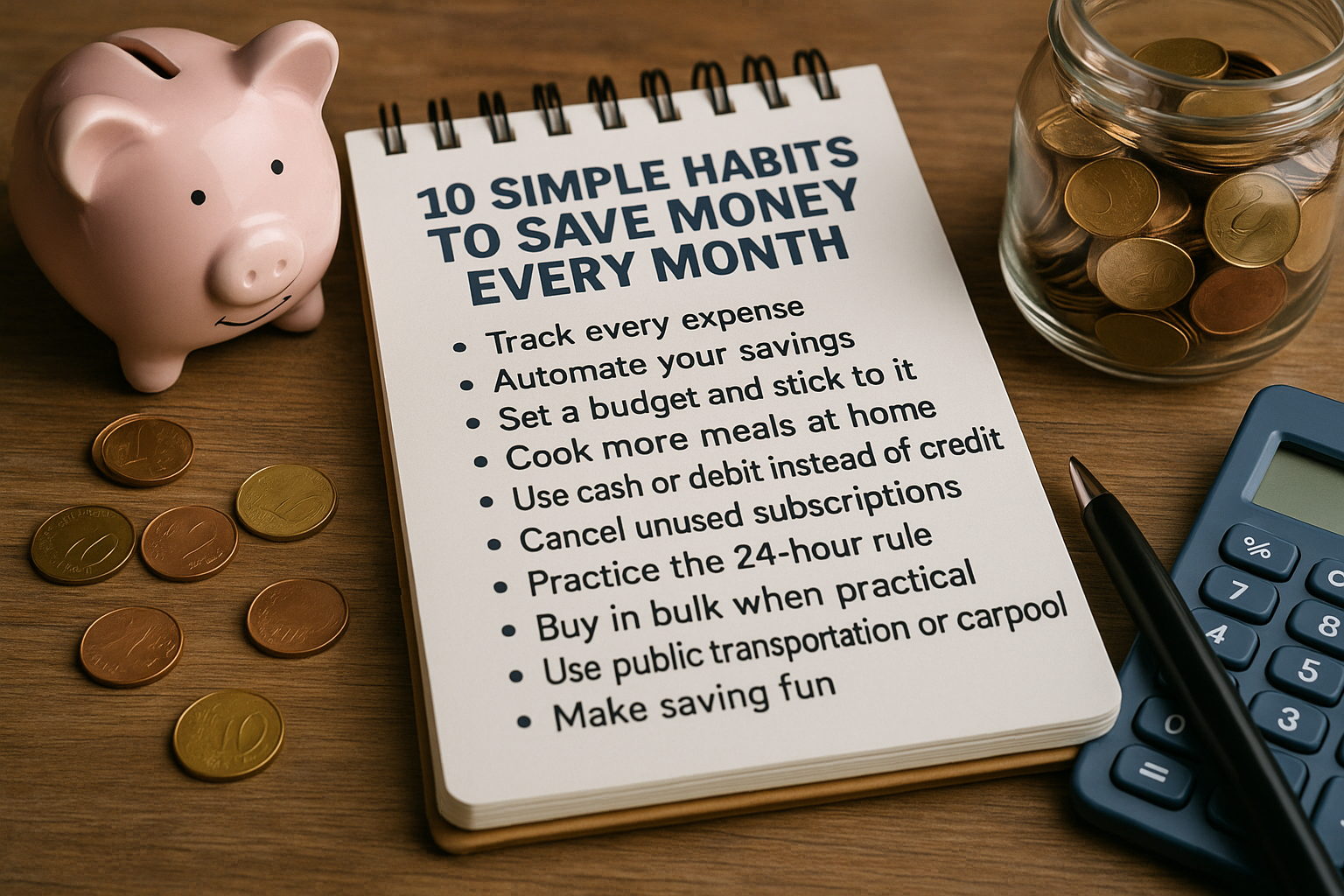Saving money doesn’t always mean making big sacrifices. Often, the small changes you make in your daily habits can lead to significant long-term savings. Whether you’re looking to build an emergency fund, pay off debt, or invest for the future, these 10 simple and effective habits can help you save money every single month.
1. Track Every Expense
The first step to saving money is knowing exactly where it’s going. Keep track of all your spending—yes, even that $2 coffee. You can do this with a spreadsheet, a notebook, or a budgeting app like Mint, YNAB, or PocketGuard.
Why It Matters
When you become aware of your spending patterns, it’s easier to identify and eliminate unnecessary expenses. A $10 subscription here and a $7 snack there might not seem like much, but they add up quickly.
2. Automate Your Savings
One of the easiest ways to save is by not thinking about it.
Set It and Forget It
Have a portion of your paycheck automatically transferred to your savings account every time you get paid. Even $25 a week adds up to $1,300 a year without any effort on your part.
Use Multiple Accounts
Consider having separate accounts for your emergency fund, vacation savings, or specific goals. This prevents you from dipping into your savings unintentionally.
3. Set a Budget and Stick to It
Creating a realistic monthly budget gives your money a plan.
Start with the Essentials
Include your housing, food, transportation, and debt payments first. Then allocate money for savings and discretionary spending. Stick to your limits, and adjust when necessary.
Use the 50/30/20 Rule
This guideline suggests:
- 50% of your income goes to needs
- 30% to wants
- 20% to savings and debt repayment
Adjust the percentages to suit your financial goals.
4. Cook More Meals at Home
Dining out or ordering takeout can take a big bite out of your budget.
Plan Your Meals
Take 30 minutes each week to plan meals and grocery shop with a list. Look for affordable, healthy meals that can be made in bulk and stored.
Save on Groceries
Use coupons, compare store prices, and consider buying generic brands to reduce your grocery bill.
5. Use Cash or Debit Instead of Credit
When you pay with credit, it’s easier to overspend.
Feel the Spending
Using cash or a debit card creates a physical connection to your money. You’re more likely to pause and consider purchases before making them.
Avoid Interest
If you do use credit cards, make sure to pay the full balance each month to avoid interest charges that erode your savings.
6. Cancel Unused Subscriptions
Subscription services can sneak up on your budget.
Review Monthly Charges
Go through your bank or credit card statements and cancel anything you don’t use regularly—streaming services, apps, gym memberships, and more.
Use Subscription Trackers
Apps like Truebill or Rocket Money can help identify recurring charges and even cancel subscriptions on your behalf.
7. Practice the 24-Hour Rule
Impulse buying is one of the biggest enemies of saving.
Delay Purchases
Before buying something non-essential, wait 24 hours. More often than not, you’ll decide you don’t need it after all.
Make a Wishlist
If it’s still on your mind after a few days, add it to a wishlist and plan for it in your budget.
8. Buy in Bulk When Practical
Buying larger quantities of non-perishable items can save money in the long run.
Shop Smart
Items like toilet paper, rice, pasta, and canned goods are often cheaper per unit when bought in bulk. Be careful with perishables—don’t buy more than you can use.
Consider Warehouse Memberships
Stores like Costco or Sam’s Club offer bulk discounts, but only join if the annual fee is worth your expected savings.
9. Use Public Transportation or Carpool
Transportation costs can be one of your biggest monthly expenses.
Reduce Gas and Maintenance Costs
If public transportation is available in your area, it’s usually much cheaper than owning and maintaining a vehicle. If not, try carpooling with co-workers or neighbors.
Combine Errands
Planning your trips efficiently can help save fuel and time.
10. Make Saving Fun
Building good financial habits doesn’t have to be boring.
Turn It Into a Game
Challenge yourself to have no-spend days or try a savings challenge like the 52-week challenge.
Reward Yourself (Wisely)
Celebrate milestones—like saving your first $500—with a small, budget-friendly treat. This keeps you motivated without derailing your progress.
Final Words: Small Changes Lead to Big Results
The key to saving money consistently isn’t in making huge lifestyle changes overnight. It’s about creating sustainable habits that fit your life. Start with one or two habits from this list and build from there. Over time, you’ll find that you’re not only saving more, but you’re also gaining confidence and control over your financial future.
